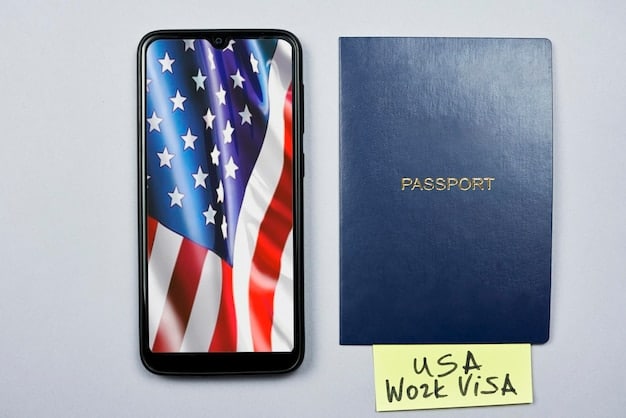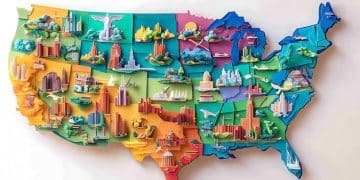Digital Nomad Visas in the US: Your 2025 Guide to Extended Stays

Anúncios
Digital nomad visas in the US are not currently available as a specific visa category; however, options exist for extended stays including tourist visas allowing up to six months, student visas for study, and employment-based visas contingent on meeting eligibility requirements and finding a US-based employer.
Dreaming of working remotely from the US? While a dedicated digital nomad visa in the US doesn’t exist yet, understanding the available alternatives for extended stays in 2025 is crucial for planning your adventure.
Anúncios
Exploring Digital Nomad Opportunities in the US
The allure of the United States as a destination for digital nomads is undeniable. With its diverse landscapes, thriving cities, and vibrant culture, it’s a place where remote work and adventure can seamlessly blend. However, when it comes to staying long-term, the options aren’t as straightforward as some other countries. Let’s delve into what paths you can explore.
Understanding the Current Visa Landscape
Currently, the US doesn’t offer a specific visa tailored for digital nomads. This means you’ll need to navigate existing visa options, each with its own requirements and limitations. Knowing the details of these options is key to finding one that suits your needs.
Anúncios
The B-1/B-2 Visitor Visa: A Short-Term Solution
The B-1/B-2 visa is a common choice for tourists and business travelers. As a digital nomad, you might consider this for shorter stays, but it’s essential to understand its restrictions. It’s designed for tourism and limited business activities, not for engaging in employment that benefits a US-based entity.
- Duration: Typically allows stays of up to six months.
- Activities Allowed: Tourism, attending conferences, and limited business consultations.
- Restrictions: Cannot be used for employment or activities that generate income from a US source.
Navigating visa options requires careful consideration of your activities and intentions while in the US. The B-1/B-2 visa offers flexibility for tourism and limited business engagements, but digital nomads should ensure their activities align with the visa’s limitations to avoid any immigration issues. Consulting with an immigration attorney can provide tailored guidance.

Alternative Visa Options for Longer Stays
For those seeking extended periods of remote work in the US, several alternative visa options provide pathways beyond the typical tourist stay. Understanding the requirements and limitations of each is crucial for compliant and successful long-term arrangements.
The F-1 Student Visa: A Pathway Through Education
The F-1 student visa allows individuals to study at a US educational institution. While it might not be the most direct route, it can provide a legal basis for staying in the country while pursuing educational goals. Enrolling in a program that interests you could be a viable option.
The E-2 Treaty Investor Visa: For Entrepreneurs
The E-2 visa is for citizens of treaty countries who invest a substantial amount of capital in a US business. If you’re an entrepreneur, this could be an avenue to explore, provided your country has a treaty with the US and you meet the investment requirements.
- Treaty Requirement: Must be a citizen of a country that has a treaty of commerce and navigation with the US.
- Substantial Investment: Requires a significant financial investment in a US-based business.
- Active Involvement: Must be actively involved in the management and direction of the business.
For entrepreneurs aiming to operate a business in the US while residing there, the E-2 Treaty Investor Visa offers an avenue contingent on treaty eligibility, significant investment, and active engagement in running the enterprise. Consulting with immigration experts is essential for assessing eligibility and navigating the application process.
Navigating State-Specific Considerations
The digital nomad experience in the US can vary significantly depending on the state you choose to reside in. Each state offers a unique blend of opportunities, challenges, and lifestyle factors that can impact your overall experience. It’s important to research and consider these state-specific considerations when planning your stay.
Cost of Living: Understanding Regional Differences
The cost of living can vary drastically from state to state and even within different cities in the same state. States like California and New York tend to have higher costs of living compared to states in the Midwest or South. Understanding these regional differences is critical for budgeting and financial planning.
Tax Implications for Digital Nomads
Tax laws can be complex for digital nomads, especially when working across state lines or earning income from foreign sources. Different states have varying tax rates and rules, so it’s important to understand your tax obligations based on where you’re residing and working.
- State Income Tax: Some states have state income tax while others don’t.
- Nexus: Establishing a physical presence in a state may create a tax nexus, requiring you to pay taxes in that state.
- Foreign Income: Understanding how your foreign income is taxed is crucial for compliance.

Digital nomads should carefully consider state-specific factors such as cost of living, taxes, and legal requirements when choosing a location in the US. Thorough research and consultation with experts can help ensure a smooth and compliant experience. It’s essential to weigh the pros and cons of different states to align with your lifestyle and financial goals.
Building a Compliant Digital Nomad Lifestyle
Creating a compliant digital nomad lifestyle in the United States involves careful planning, adherence to immigration regulations, and a clear understanding of your responsibilities. Navigating this landscape requires attention to detail and a proactive approach.
Understanding the Rules and Limitations
Each visa category comes with specific rules and limitations that you must adhere to. Overstaying your visa, engaging in unauthorized employment, or violating other terms can have serious consequences, including deportation and restrictions on future entry.
Seeking Professional Guidance
Navigating the complexities of US immigration law can be challenging, especially for digital nomads who may have unique circumstances. Consulting with an immigration attorney can provide valuable guidance and ensure you’re making informed decisions.
- Visa Options: Understanding eligibility requirements and selecting the appropriate visa.
- Compliance: Ensuring adherence to visa terms and avoiding violations.
- Long-Term Planning: Developing a sustainable plan for maintaining legal status in the US.
Building a compliant digital nomad lifestyle in the US requires adherence to visa regulations, seeking professional legal guidance, and careful attention to financial responsibilities. By understanding the rules, staying informed, and seeking expert advice, digital nomads can navigate the US immigration landscape lawfully and successfully.
Future Trends in Digital Nomad Visas
The global landscape of remote work is evolving rapidly, and with it, the demand for digital nomad visas is growing. Several countries have already introduced specific visas to attract remote workers, and there’s potential for the US to follow suit in the future.
The Rise of Remote Work and its Impact
The COVID-19 pandemic accelerated the adoption of remote work, and many companies are now embracing it as a long-term strategy. This shift has fueled the demand for digital nomad visas, as more people seek the freedom to work from anywhere.
Potential Policy Changes in the US
While there’s no specific digital nomad visa in the US yet, there’s growing awareness of the economic benefits that remote workers can bring. Policy changes could be on the horizon, potentially leading to new visa options tailored for digital nomads.
- Economic Impact: Recognizing the potential economic contributions of digital nomads.
- Global Competition: Staying competitive with other countries that offer digital nomad visas.
- Workforce Evolution: Adapting to the changing nature of work and the rise of remote professionals.
Resources and Tools for Digital Nomads in the US
Navigating the digital nomad lifestyle in the United States requires access to reliable resources and tools that can help you stay informed, connected, and compliant. These resources can range from online platforms to professional services tailored to the unique needs of remote workers.
Online Communities and Forums
Joining online communities and forums can provide a valuable support network for digital nomads in the US. These platforms offer opportunities to connect with like-minded individuals, share experiences, and ask questions about visas, taxes, and other relevant topics.
Legal and Financial Services
Access to legal and financial services is essential for maintaining a compliant and sustainable digital nomad lifestyle. Consulting with immigration attorneys, tax advisors, and financial planners can help you navigate the complexities of US law and manage your finances effectively.
- Immigration Attorneys: Providing guidance on visa options and compliance.
- Tax Advisors: Helping you understand your tax obligations and minimize your tax burden.
- Financial Planners: Offering strategies for managing your finances and planning for your future.
| Key Point | Brief Description |
|---|---|
| 🛂 Visa Options | Explore B-1/B-2, F-1, and E-2 visas for extended stays. |
| 💰 State-Specific Costs | Consider the cost of living and tax implications in different states. |
| ⚖️ Compliance | Adhere to visa rules and seek legal advice for compliance. |
| 🌐 Future Trends | Stay updated on potential policy changes for digital nomads. |
Frequently Asked Questions
No, the US does not currently offer a visa specifically for digital nomads. You’ll need to explore alternative options like the B-1/B-2 visitor visa or other eligible visas.
The B-1/B-2 visa typically allows stays of up to six months. However, the exact duration is determined by Customs and Border Protection (CBP) upon entry.
Yes, you can work remotely for a foreign company as long as you’re not engaging in employment that benefits a US-based entity or receiving income from a US source.
You must be a citizen of a country that has a treaty with the US, invest a substantial amount of capital in a US business, and be actively involved in its management.
Online communities, immigration attorneys, tax advisors, and financial planners can provide valuable resources and support for digital nomads in the US.
Conclusion
While a dedicated digital nomad visa in the US is still on the horizon, understanding the existing alternatives and planning carefully can make your remote dreams a reality. By exploring options like the B-1/B-2 visa, student visas, or investment visas, and staying informed about state-specific considerations, you can navigate the US landscape and create a fulfilling and compliant digital nomad experience.





